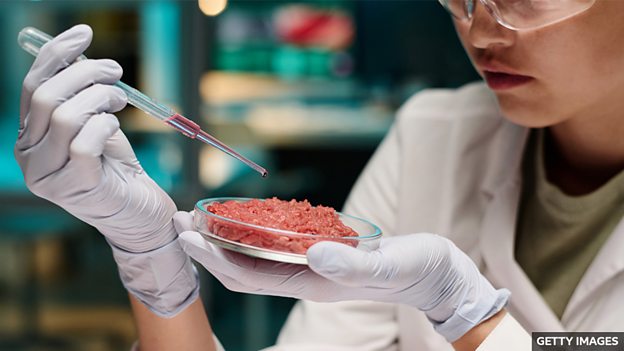如今,有很多人选择不吃肉。实验室培育肉已经被讨论了多年,但为什么我们直至今日仍然不能在超市或餐馆买到这种肉呢?这是因为生产这种肉的成本非常高,主要原因是在实验室环境下培育这种肉的细胞需要大量的原材料。此外,还有哪些原因使实验室培育肉仍未能出现在大家的饭桌上?本文围绕这一话题展开讨论。
词汇:meat 肉
Imagine a future where we can tuck into meat, but no animals have been sacrificed in the process. 16% of the UK population enjoy a meat-free diet, according to statistics website Finder.com. It seems there is an appeal in lab-grown meat as an alternative to traditional meat consumption. But, despite years of anticipation, this futuristic food is still not on our plates. Why?
One of the biggest reasons is cost. The first ever lab-grown hamburger was unveiled in 2013 by Dutch scientist Mark Post. It was created from beef cells and cost more than $300,000. Lab-grown meat production stretches from thousands to hundreds of thousands of US dollars per ounce – that's the weight of about two chicken nuggets. This expense is partly due to the cost of raw materials that 'feed' the cells – a combination of sugar, proteins and other nutrients are added to the cells.
In 2023, US-based company Upside Foods received approval from the US Department of Agriculture and the Food and Drug Administration to start selling lab-grown meat. In order to do this, the company has had to take on significant economic losses so that they can price it fairly compared to traditional meat. An investor in Upside Food, Lisa Feria, told Forbes magazine "Profitability is very much years off because the biggest challenge ahead of them is can we make it at millions of tons a year and ultimately remotely compete with conventional meat".
There are also environmental costs. A 2023 study by the University of California found that the process of producing lab-grown meat could have a four to 25 times higher impact on global warming than beef, which is generally the highest-polluting meat. This is mostly because of the emissions needed to create 'feed'.
So, it seems unlikely that we'll be eating lab-grown meat just yet, and we possibly never will.
词汇表
tuck into 尽情吃
meat-free 无肉的
diet (日常)饮食
lab-grown 实验室培育的
traditional 传统的
consumption 食用,消耗
plate 餐盘
hamburger 汉堡包
beef cell 牛肉细胞
production 生产
ounce (重量单位)盎司;1盎司约等于28克
chicken nugget 炸鸡肉
raw material 原材料
feed 给…提供养分
conventional 普通的
highest-polluting 最毁坏环境的
测验与练习
1. 阅读课文并回答问题。
1. What kind of diet do 16% of people in the UK have?
2. Who created the first ever lab-grown hamburger?
3. What is in the 'feed' that is used to grow the meat cells?
4. True or False? Lisa Feria thinks lab-grown meat will be profitable soon.
5. What effect could the production of lab-grown meat have on global warming?
2. 选择意思恰当的单词或词组来完成下列句子。
1. This look delicious. I'm going to _______ the chips first.
tuck into grow feed unveil
2. I don't eat anything from an animal. I have a completely _______ diet.
meat-free lab-grown highest-polluting significant
3. The company has removed its food product from supermarkets as it was found to be not fit for human _______.
plate consumption cell raw material
4. A _______ is the smallest and most basic unit of a plant or animal.
plate hamburger chicken nugget cell
5. This bird so tiny. It can't weigh more than _______.
diet tons two ounces production
答案
1. 阅读课文并回答问题。
1. What kind of diet do 16% of people in the UK have?
16% of the UK population enjoy a meat-free diet.
2. Who created the first ever lab-grown hamburger?
The first ever lab-grown hamburger made was unveiled in 2013 by Dutch scientist Mark Post.
3. What is in the 'feed' that is used to grow the meat cells?
The 'feed' is a combination of sugar, proteins and other nutrients.
4. True or False? Lisa Feria thinks lab-grown meat will be profitable soon.
False. Lisa says "profitability is very much years off".
5. What effect could the production of lab-grown meat have on global warming?
Lab-grown meat could have a four to 25 times higher impact on global warming than beef.
2. 选择意思恰当的单词或词组来完成下列句子。
1. This look delicious. I'm going to tuck into the chips first.
2. I don't eat anything from an animal. I have a completely meat-free diet.
3. The company has removed its food product from supermarkets as it was found to be not fit for human consumption.
4. A cell is the smallest and most basic unit of a plant or animal.
5. This bird is so tiny. It can't weigh more than two ounces.

